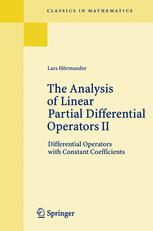

Most ebook files are in PDF format, so you can easily read them using various software such as Foxit Reader or directly on the Google Chrome browser.
Some ebook files are released by publishers in other formats such as .awz, .mobi, .epub, .fb2, etc. You may need to install specific software to read these formats on mobile/PC, such as Calibre.
Please read the tutorial at this link: https://ebookbell.com/faq
We offer FREE conversion to the popular formats you request; however, this may take some time. Therefore, right after payment, please email us, and we will try to provide the service as quickly as possible.
For some exceptional file formats or broken links (if any), please refrain from opening any disputes. Instead, email us first, and we will try to assist within a maximum of 6 hours.
EbookBell Team

0.0
0 reviewsThis volume is an expanded version of Chapters III, IV, V and VII of my 1963 book "Linear partial differential operators". In addition there is an entirely new chapter on convolution equations, one on scattering theory, and one on methods from the theory of analytic functions of several complex variables. The latter is somewhat limited in scope though since it seems superfluous to duplicate the monographs by Ehrenpreis and by Palamodov on this subject. The reader is assumed to be familiar with distribution theory as presented in Volume I. Most topics discussed here have in fact been encountered in Volume I in special cases, which should provide the necessary motivation and background for a more systematic and precise exposition. The main technical tool in this volume is the Fourier- Laplace transformation. More powerful methods for the study of operators with variable coefficients will be developed in Volume III. However, constant coefficient theory has given the guidance for all that work. Although the field is no longer very active - perhaps because of its advanced state of development - and although it is possible to pass directly from Volume I to Volume III, the material presented here should not be neglected by the serious student who wants to gain a balanced perspective of the theory of linear partial differential equations.